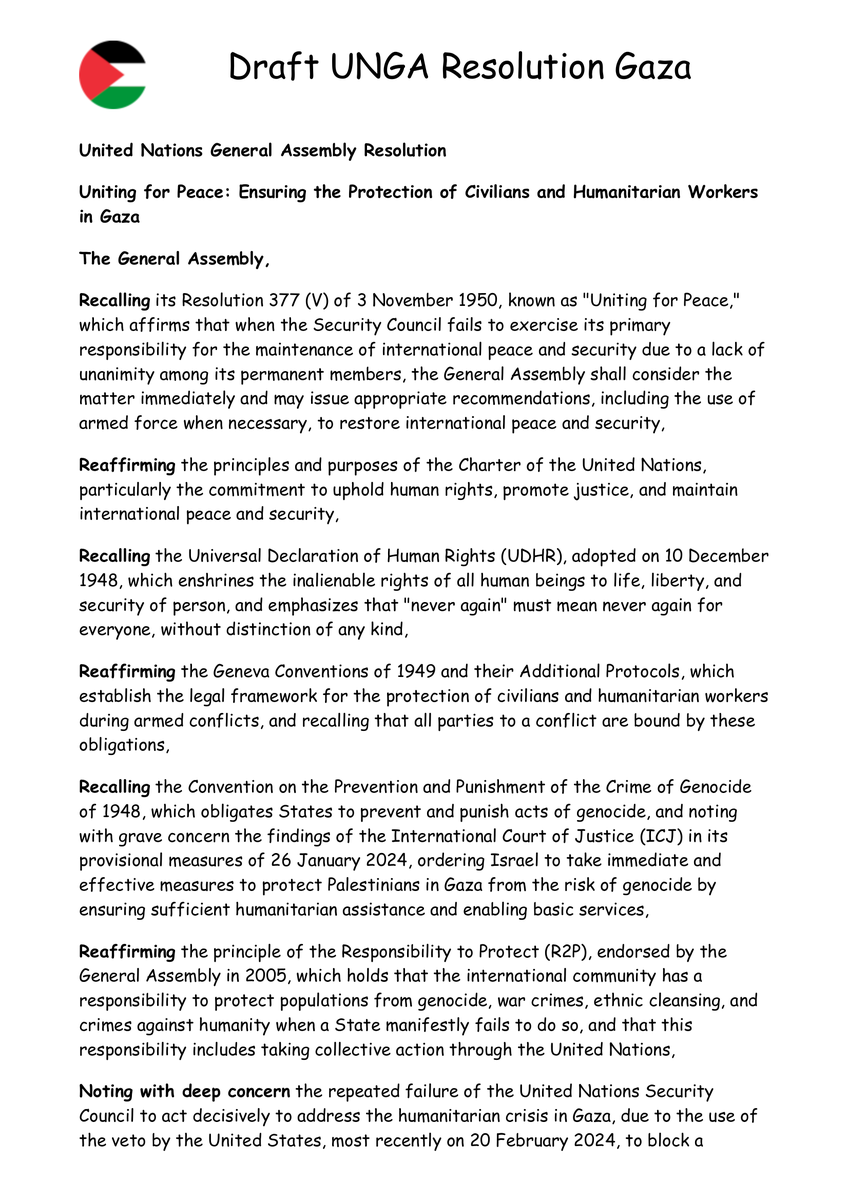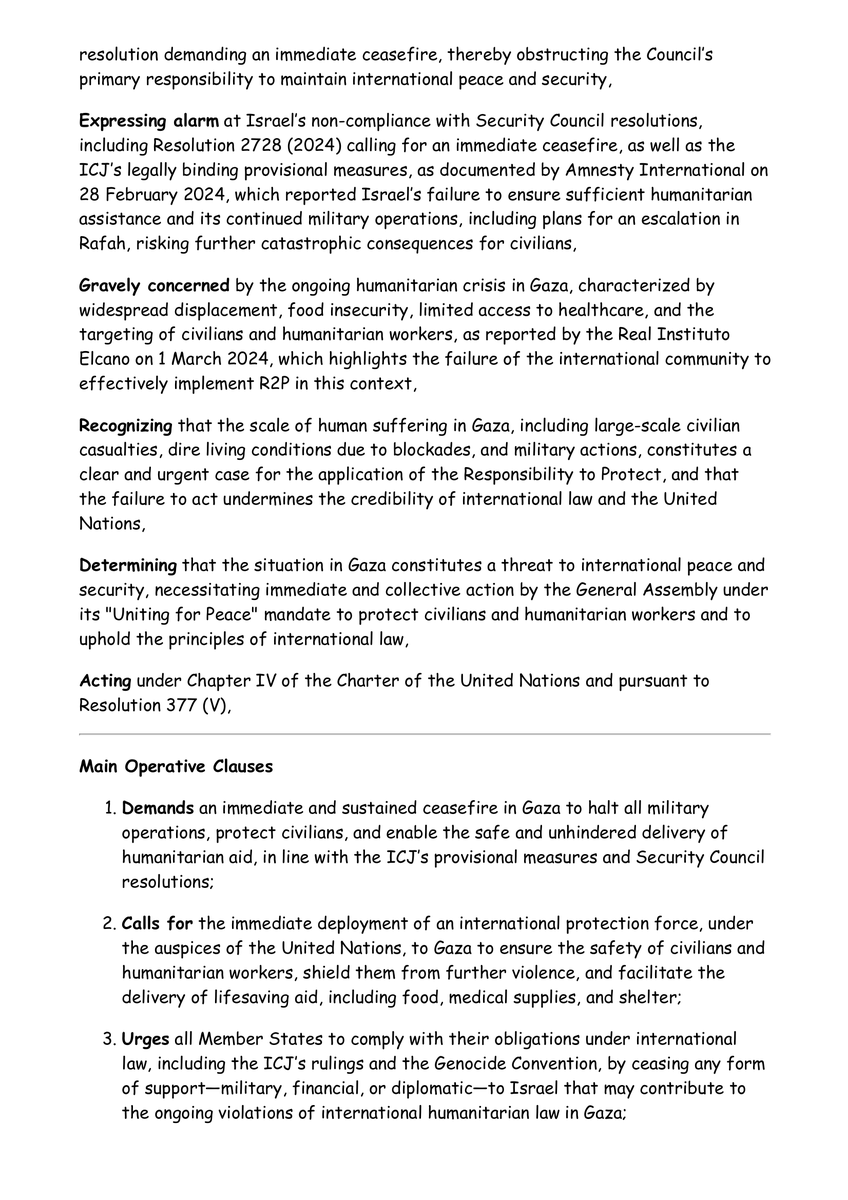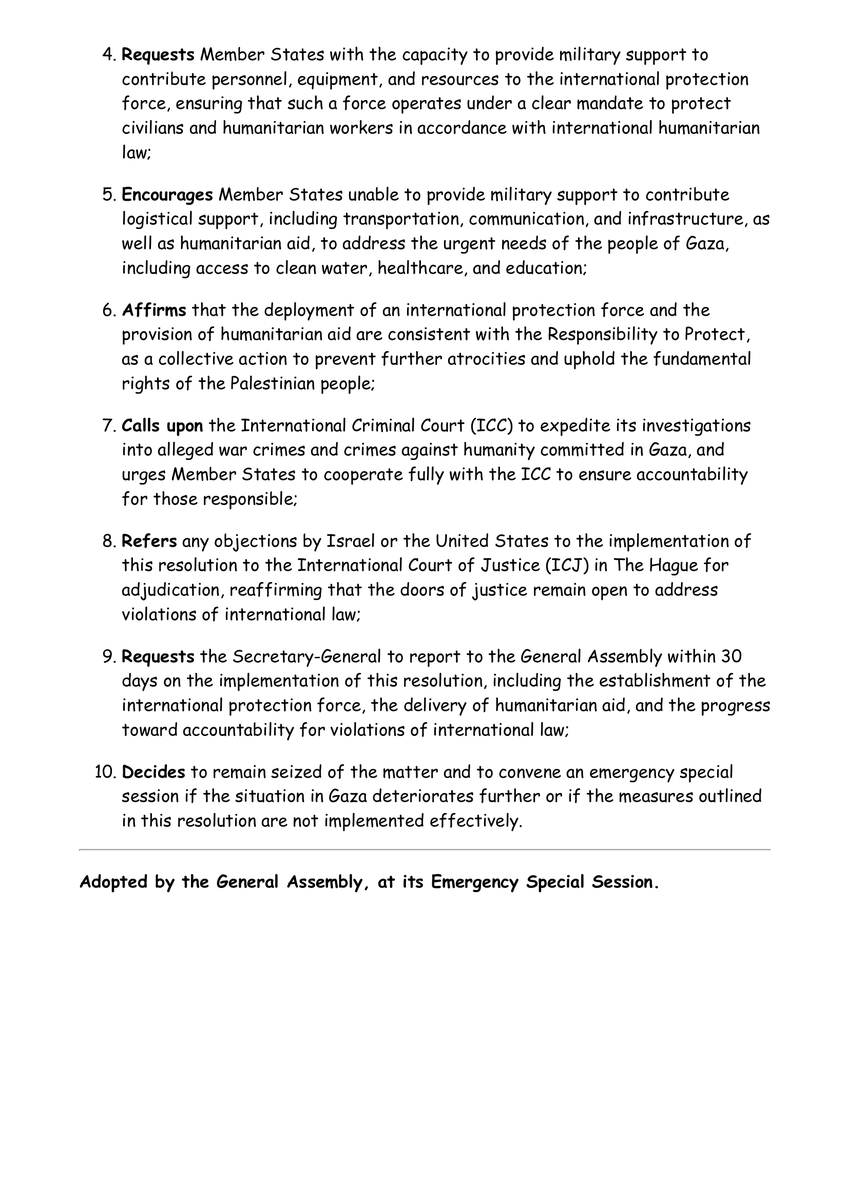Many 🇵🇸activists are still playing the blame game although Israel's reputation already lies in rubble. We need to shift focus to protect the people in Gaza. Trump has other problems than aiding Israel against action mandated by the UN General Assembly at the moment. https://x.com/CraigMokhiber/status/1908657011715088579
The UN must protect Gaza’s people under its Charter, UDHR, IHL, GC IV, CPPCG, ICCPR, ICESCR, CRC, UNSCR 242, 338, 2728, & R2P.
I urge @antonioguterres to convene ES10, and floor this resolution to ensure their safety. #GazaCrisis https://x.com/R34lB0rg/status/1908630703849492501
The UN must protect Gaza’s people under its Charter, UDHR, IHL, GC IV, CPPCG, ICCPR, ICESCR, CRC, UNSCR 242, 338, 2728, & R2P. I urge @UN_PGA to fulfill its duty, convene ES10, & floor this resolution to ensure their safety. #GazaCrisis https://x.com/R34lB0rg/status/1908630703849492501
The UN must protect Gaza’s people under its Charter, UDHR, IHL, GC IV, CPPCG, ICCPR, ICESCR, CRC, UNSCR 242, 338, 2728, & R2P. I urge @UNGA to fulfill its duty, convene ES10, & floor this resolution to ensure their safety. #GazaCrisis https://x.com/R34lB0rg/status/1908630703849492501
Hi @guychristensen_, can you please help amplify this? We need grassroots pressure to get this floored at the UN. Your support would be very appreciated! https://x.com/R34lB0rg/status/1908625260158869884 https://x.com/R34lB0rg/status/1908786739176497407/photo/1

This incident is an extremely difficult (further) breaking point in relations between the IDF and the international media. The army and its spokesmen lied to all the media outlets in the world in their initial response. The damage caused to Israel by this lie alone - even before the actual incident in which war crimes were allegedly committed - is enormous.
United Nations General Assembly Resolution
Uniting for Peace: Ensuring the Protection of Civilians and Humanitarian Workers in Gaza
The General Assembly,
Recalling its Resolution 377 (V) of 3 November 1950, known as "Uniting for Peace," which affirms that when the Security Council fails to exercise its primary responsibility for the maintenance of international peace and security due to a lack of unanimity among its permanent members, the General Assembly shall consider the matter immediately and may issue appropriate recommendations, including the use of armed force when necessary, to restore international peace and security,
Reaffirming the principles and purposes of the Charter of the United Nations, particularly the commitment to uphold human rights, promote justice, and maintain international peace and security,
Recalling the Universal Declaration of Human Rights (UDHR), adopted on 10 December 1948, which enshrines the inalienable rights of all human beings to life, liberty, and security of person, and emphasizes that "never again" must mean never again for everyone, without distinction of any kind,
Reaffirming the Geneva Conventions of 1949 and their Additional Protocols, which establish the legal framework for the protection of civilians and humanitarian workers during armed conflicts, and recalling that all parties to a conflict are bound by these obligations,
Recalling the Convention on the Prevention and Punishment of the Crime of Genocide of 1948, which obligates States to prevent and punish acts of genocide, and noting with grave concern the findings of the International Court of Justice (ICJ) in its provisional measures of 26 January 2024, ordering Israel to take immediate and effective measures to protect Palestinians in Gaza from the risk of genocide by ensuring sufficient humanitarian assistance and enabling basic services,
Reaffirming the principle of the Responsibility to Protect (R2P), endorsed by the General Assembly in 2005, which holds that the international community has a responsibility to protect populations from genocide, war crimes, ethnic cleansing, and crimes against humanity when a State manifestly fails to do so, and that this responsibility includes taking collective action through the United Nations,
Noting with deep concern the repeated failure of the United Nations Security Council to act decisively to address the humanitarian crisis in Gaza, due to the use of the veto by the United States, most recently on 20 February 2024, to block a resolution demanding an immediate ceasefire, thereby obstructing the Council’s primary responsibility to maintain international peace and security,
Expressing alarm at Israel’s non-compliance with Security Council resolutions, including Resolution 2728 (2024) calling for an immediate ceasefire, as well as the ICJ’s legally binding provisional measures, as documented by Amnesty International on 28 February 2024, which reported Israel’s failure to ensure sufficient humanitarian assistance and its continued military operations, including plans for an escalation in Rafah, risking further catastrophic consequences for civilians,
Gravely concerned by the ongoing humanitarian crisis in Gaza, characterized by widespread displacement, food insecurity, limited access to healthcare, and the targeting of civilians and humanitarian workers, as reported by the Real Instituto Elcano on 1 March 2024, which highlights the failure of the international community to effectively implement R2P in this context,
Recognizing that the scale of human suffering in Gaza, including large-scale civilian casualties, dire living conditions due to blockades, and military actions, constitutes a clear and urgent case for the application of the Responsibility to Protect, and that the failure to act undermines the credibility of international law and the United Nations,
Determining that the situation in Gaza constitutes a threat to international peace and security, necessitating immediate and collective action by the General Assembly under its "Uniting for Peace" mandate to protect civilians and humanitarian workers and to uphold the principles of international law,
Acting under Chapter IV of the Charter of the United Nations and pursuant to Resolution 377 (V),
Demands an immediate and sustained ceasefire in Gaza to halt all military operations, protect civilians, and enable the safe and unhindered delivery of humanitarian aid, in line with the ICJ’s provisional measures and Security Council resolutions;
Calls for the immediate deployment of an international protection force, under the auspices of the United Nations, to Gaza to ensure the safety of civilians and humanitarian workers, shield them from further violence, and facilitate the delivery of lifesaving aid, including food, medical supplies, and shelter;
Urges all Member States to comply with their obligations under international law, including the ICJ’s rulings and the Genocide Convention, by ceasing any form of support—military, financial, or diplomatic—to Israel that may contribute to the ongoing violations of international humanitarian law in Gaza;
Requests Member States with the capacity to provide military support to contribute personnel, equipment, and resources to the international protection force, ensuring that such a force operates under a clear mandate to protect civilians and humanitarian workers in accordance with international humanitarian law;
Encourages Member States unable to provide military support to contribute logistical support, including transportation, communication, and infrastructure, as well as humanitarian aid, to address the urgent needs of the people of Gaza, including access to clean water, healthcare, and education;
Affirms that the deployment of an international protection force and the provision of humanitarian aid are consistent with the Responsibility to Protect, as a collective action to prevent further atrocities and uphold the fundamental rights of the Palestinian people;
Calls upon the International Criminal Court (ICC) to expedite its investigations into alleged war crimes and crimes against humanity committed in Gaza, and urges Member States to cooperate fully with the ICC to ensure accountability for those responsible;
Refers any objections by Israel or the United States to the implementation of this resolution to the International Court of Justice (ICJ) in The Hague for adjudication, reaffirming that the doors of justice remain open to address violations of international law;
Requests the Secretary-General to report to the General Assembly within 30 days on the implementation of this resolution, including the establishment of the international protection force, the delivery of humanitarian aid, and the progress toward accountability for violations of international law;
Decides to remain seized of the matter and to convene an emergency special session if the situation in Gaza deteriorates further or if the measures outlined in this resolution are not implemented effectively.
Adopted by the General Assembly, at its Emergency Special Session.

Dear esteemed High Commissioner for Human Rights @volker_turk, may I kindly ask for your guidance to get this on the agenda for the next ES10 session? #HumanRights #Gaza https://x.com/R34lB0rg/status/1908625260158869884
United Nations General Assembly Resolution
Uniting for Peace: Ensuring the Protection of Civilians and Humanitarian Workers in Gaza
The General Assembly,
Recalling its Resolution 377 (V) of 3 November 1950, known as "Uniting for Peace," which affirms that when the Security Council fails to exercise its primary responsibility for the maintenance of international peace and security due to a lack of unanimity among its permanent members, the General Assembly shall consider the matter immediately and may issue appropriate recommendations, including the use of armed force when necessary, to restore international peace and security,
Reaffirming the principles and purposes of the Charter of the United Nations, particularly the commitment to uphold human rights, promote justice, and maintain international peace and security,
Recalling the Universal Declaration of Human Rights (UDHR), adopted on 10 December 1948, which enshrines the inalienable rights of all human beings to life, liberty, and security of person, and emphasizes that "never again" must mean never again for everyone, without distinction of any kind,
Reaffirming the Geneva Conventions of 1949 and their Additional Protocols, which establish the legal framework for the protection of civilians and humanitarian workers during armed conflicts, and recalling that all parties to a conflict are bound by these obligations,
Recalling the Convention on the Prevention and Punishment of the Crime of Genocide of 1948, which obligates States to prevent and punish acts of genocide, and noting with grave concern the findings of the International Court of Justice (ICJ) in its provisional measures of 26 January 2024, ordering Israel to take immediate and effective measures to protect Palestinians in Gaza from the risk of genocide by ensuring sufficient humanitarian assistance and enabling basic services,
Reaffirming the principle of the Responsibility to Protect (R2P), endorsed by the General Assembly in 2005, which holds that the international community has a responsibility to protect populations from genocide, war crimes, ethnic cleansing, and crimes against humanity when a State manifestly fails to do so, and that this responsibility includes taking collective action through the United Nations,
Noting with deep concern the repeated failure of the United Nations Security Council to act decisively to address the humanitarian crisis in Gaza, due to the use of the veto by the United States, most recently on 20 February 2024, to block a resolution demanding an immediate ceasefire, thereby obstructing the Council’s primary responsibility to maintain international peace and security,
Expressing alarm at Israel’s non-compliance with Security Council resolutions, including Resolution 2728 (2024) calling for an immediate ceasefire, as well as the ICJ’s legally binding provisional measures, as documented by Amnesty International on 28 February 2024, which reported Israel’s failure to ensure sufficient humanitarian assistance and its continued military operations, including plans for an escalation in Rafah, risking further catastrophic consequences for civilians,
Gravely concerned by the ongoing humanitarian crisis in Gaza, characterized by widespread displacement, food insecurity, limited access to healthcare, and the targeting of civilians and humanitarian workers, as reported by the Real Instituto Elcano on 1 March 2024, which highlights the failure of the international community to effectively implement R2P in this context,
Recognizing that the scale of human suffering in Gaza, including large-scale civilian casualties, dire living conditions due to blockades, and military actions, constitutes a clear and urgent case for the application of the Responsibility to Protect, and that the failure to act undermines the credibility of international law and the United Nations,
Determining that the situation in Gaza constitutes a threat to international peace and security, necessitating immediate and collective action by the General Assembly under its "Uniting for Peace" mandate to protect civilians and humanitarian workers and to uphold the principles of international law,
Acting under Chapter IV of the Charter of the United Nations and pursuant to Resolution 377 (V),
Demands an immediate and sustained ceasefire in Gaza to halt all military operations, protect civilians, and enable the safe and unhindered delivery of humanitarian aid, in line with the ICJ’s provisional measures and Security Council resolutions;
Calls for the immediate deployment of an international protection force, under the auspices of the United Nations, to Gaza to ensure the safety of civilians and humanitarian workers, shield them from further violence, and facilitate the delivery of lifesaving aid, including food, medical supplies, and shelter;
Urges all Member States to comply with their obligations under international law, including the ICJ’s rulings and the Genocide Convention, by ceasing any form of support—military, financial, or diplomatic—to Israel that may contribute to the ongoing violations of international humanitarian law in Gaza;
Requests Member States with the capacity to provide military support to contribute personnel, equipment, and resources to the international protection force, ensuring that such a force operates under a clear mandate to protect civilians and humanitarian workers in accordance with international humanitarian law;
Encourages Member States unable to provide military support to contribute logistical support, including transportation, communication, and infrastructure, as well as humanitarian aid, to address the urgent needs of the people of Gaza, including access to clean water, healthcare, and education;
Affirms that the deployment of an international protection force and the provision of humanitarian aid are consistent with the Responsibility to Protect, as a collective action to prevent further atrocities and uphold the fundamental rights of the Palestinian people;
Calls upon the International Criminal Court (ICC) to expedite its investigations into alleged war crimes and crimes against humanity committed in Gaza, and urges Member States to cooperate fully with the ICC to ensure accountability for those responsible;
Refers any objections by Israel or the United States to the implementation of this resolution to the International Court of Justice (ICJ) in The Hague for adjudication, reaffirming that the doors of justice remain open to address violations of international law;
Requests the Secretary-General to report to the General Assembly within 30 days on the implementation of this resolution, including the establishment of the international protection force, the delivery of humanitarian aid, and the progress toward accountability for violations of international law;
Decides to remain seized of the matter and to convene an emergency special session if the situation in Gaza deteriorates further or if the measures outlined in this resolution are not implemented effectively.
Adopted by the General Assembly, at its Emergency Special Session.


